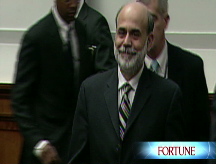Washington's ultimate solution
How to solve the financial crisis? Play for time, pray for markets to turn.

(Fortune Magazine) -- These are the dog days of summer, the height of our national vacation season. But instead of hitting the beach, people in Washington and on Wall Street are spending their days all atwitter with ideas of what new regulations and rules and controls we need to deal with our financial market meltdowns, the worst since the Great Depression almost 80 years ago.
But let me tell you a little secret, folks. Even though they're scurrying around like everyone else in this game, I think the crisis managers at the Federal Reserve Board and the Treasury have quietly adopted a technique that has helped us deal with previous financial crises - what I call the "play and pray" approach.
They don't teach it in Economics 101, and none of the players dealing with the current meltdown will talk about it on the record. But it's a time-tested strategy - think of the mortgage crisis of the late 1970s and early 1980s, the bank problems in the early 1990s, and the Asian contagion of the late 1990s. The idea: You play for time by keeping things afloat long enough for your prayers to be answered by the markets' turning in the right direction.
The theory is that if you give stricken financial institutions like Fannie Mae (FNM, Fortune 500) enough time, profits from their basic operations can help them dig out of the capital pit into which they've fallen. A few years of nice profits will help offset the big losses from past blunders, provided the company stays alive long enough.
In fact, Fannie Mae's underlying business - using borrowed money to buy mortgages - is showing increasing profitability. That's because while the Fed has cut the short-term Federal funds rate that it controls to 2% from 5.25% since September, rates on long-term mortgages have risen. HSH Associates says fixed-rate 30-year mortgages cost 6.70% in early August, up from 6.47% when the Fed first cut rates. The reason: There are far fewer sources of long-term mortgage money than before the market meltdown started last year, because falling house prices and fear of inflation have spooked lenders. Another factor is the dollar's decline, which has unnerved the foreigners who had been major mortgage investors.
I suspect that playing for time and praying for a break is also how crisis managers hope to keep financial insurers like MBIA (MBI) and Ambac (ABK) alive, to forestall what they fear could be catastrophic failures. The idea: The firms' basic business of insuring municipal securities that rarely default will over time help cover their losses from insuring collateralized debt obligations and mortgage-backed securities that they didn't understand.
Play-and-pray isn't a particularly fair policy - among other things, it means giant institutions aren't allowed to fail, while smaller ones are left to the tender mercies of the market. But given time and regulatory leeway and some good luck, this policy has a chance of working out if we can get past the hair-raising losses many big financial institutions are currently reporting.
The idea of regulating hitherto-unregulated institutions like investment banks in return for having Uncle Sam stand behind them is a good idea. So is giving regulators more power over Fannie and its sibling, Freddie Mac (FRE, Fortune 500). Those are long-term objectives. For now, though, goal No. 1 is to get through this mess. But once things have stabilized a bit, let's cram through tough regulations before memory fades. We didn't do so after the last mortgage crisis abated, and we're paying for that mistake now.
Prayers are occasionally answered. Oil prices have been falling, and if that continues, it will be enormously helpful. However, mortgage defaults among nonjunk borrowers are rising, and house prices are still falling. Air-conditioning bills in places where electricity is generated with natural gas are horrendous, and home heating bills promise to be horrendous too.
But for now, if you'll excuse me, I'm heading for the beach. If you can, I suggest you do the same. The world may not feel better when you get back - but at least you will. ![]()
-
 The retail giant tops the Fortune 500 for the second year in a row. Who else made the list? More
The retail giant tops the Fortune 500 for the second year in a row. Who else made the list? More -
 This group of companies is all about social networking to connect with their customers. More
This group of companies is all about social networking to connect with their customers. More -
 The fight over the cholesterol medication is keeping a generic version from hitting the market. More
The fight over the cholesterol medication is keeping a generic version from hitting the market. More -
 Bin Laden may be dead, but the terrorist group he led doesn't need his money. More
Bin Laden may be dead, but the terrorist group he led doesn't need his money. More -
 U.S. real estate might be a mess, but in other parts of the world, home prices are jumping. More
U.S. real estate might be a mess, but in other parts of the world, home prices are jumping. More -
 Libya's output is a fraction of global production, but it's crucial to the nation's economy. More
Libya's output is a fraction of global production, but it's crucial to the nation's economy. More -
 Once rates start to rise, things could get ugly fast for our neighbors to the north. More
Once rates start to rise, things could get ugly fast for our neighbors to the north. More









